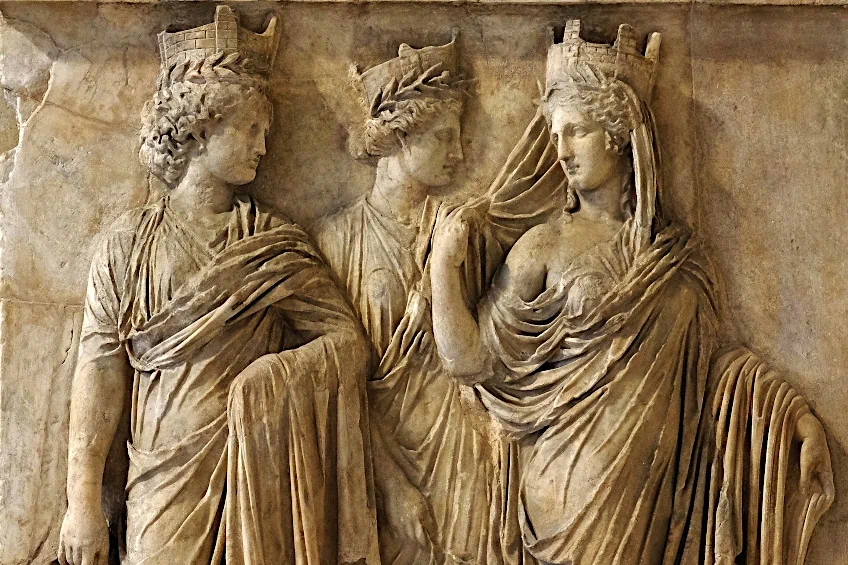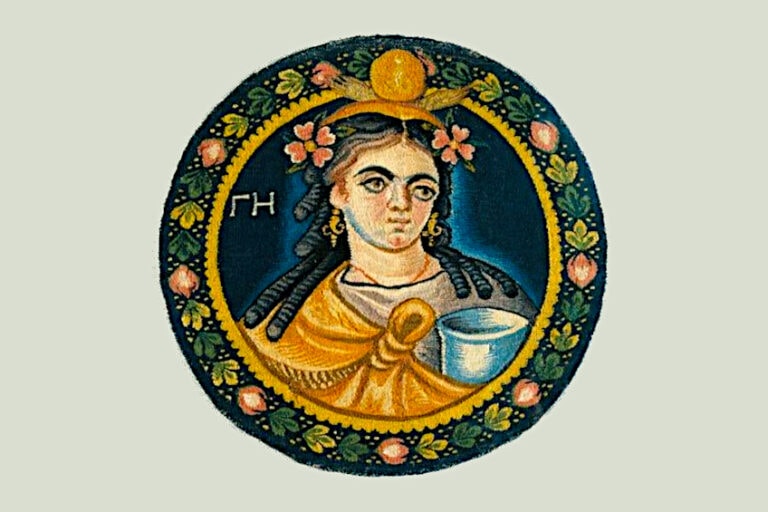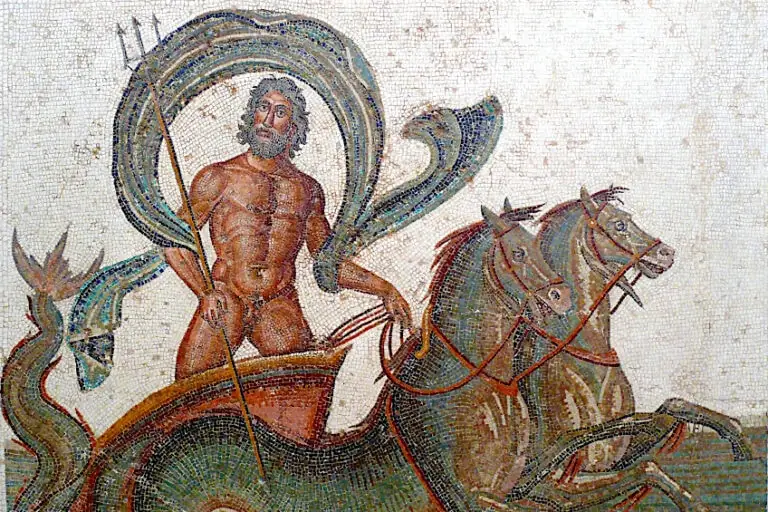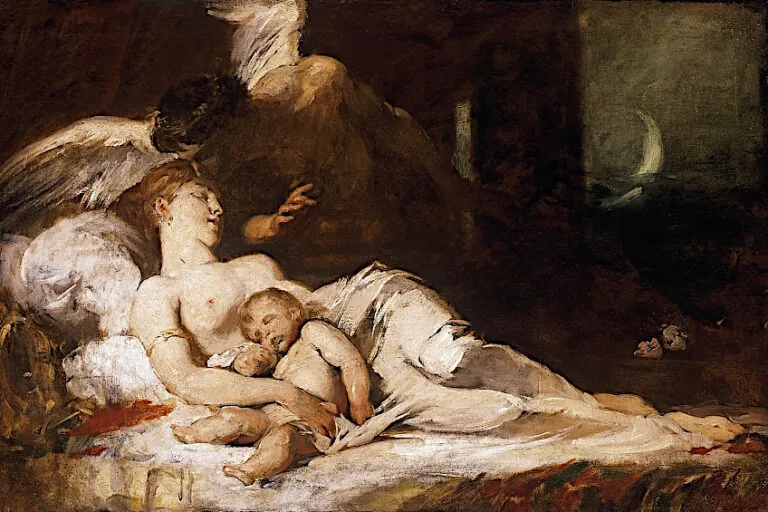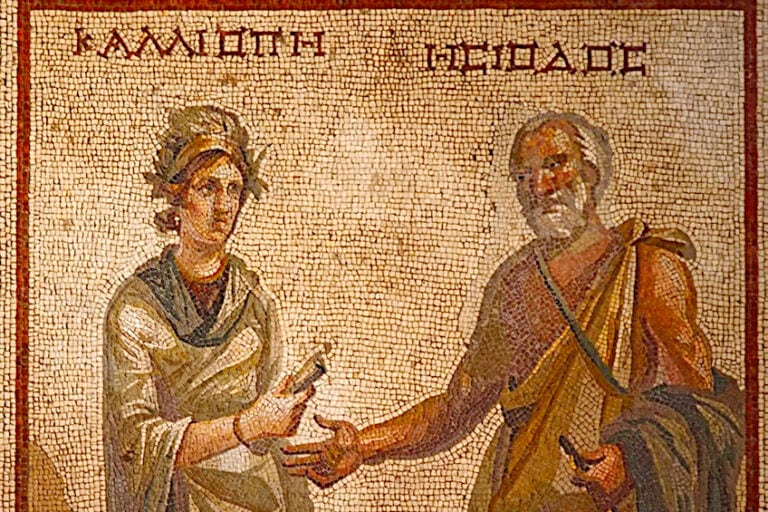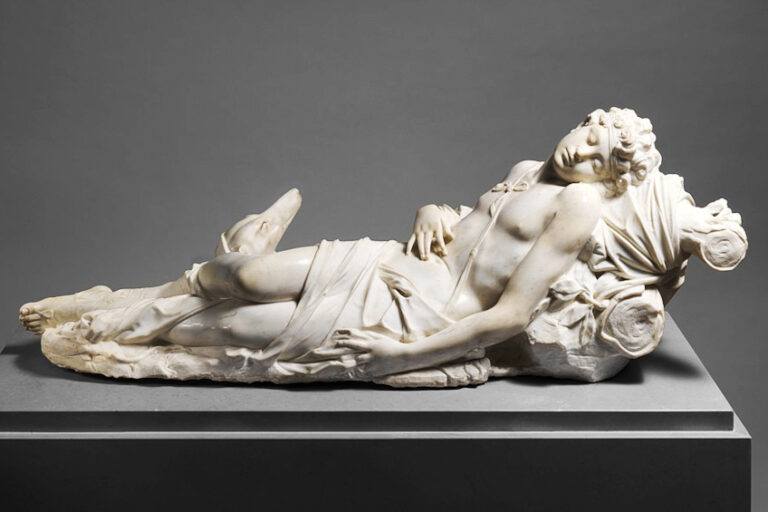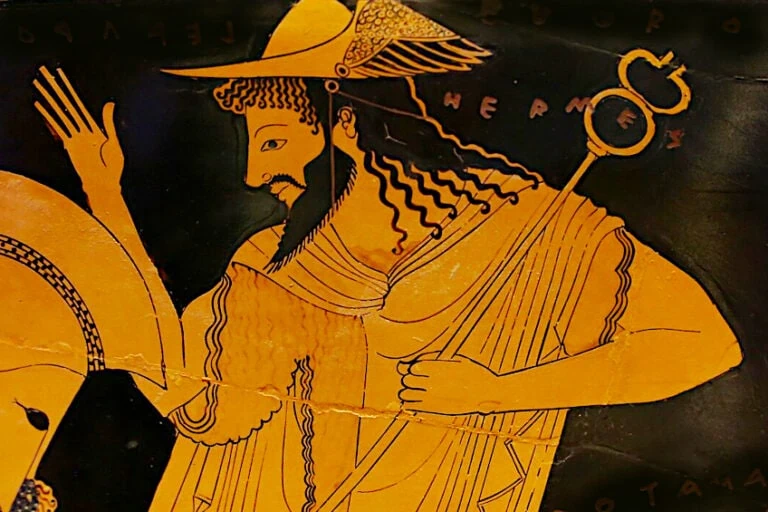Greek Goddess Tyche – The Personification of Luck and Chance
In the mythology of ancient Greece, the Greek goddess Tyche was considered the goddess of destiny and fortune. She was also regarded as the goddess of money and was prayed to by those wishing to attain greater wealth. Tyche’s symbols include the rudder and cornucopia. Let’s find out more about the role of the Greek goddess Tyche in our article below!
Contents
The Role of the Goddess of Destiny and Fortune: Tyche
| Name | Tyche |
| Gender | Female |
| Divinity of | Money, destiny, and fortune |
| Personality | Capricious and fickle |
| Symbols | Rudder, cornucopia, ball, wheel, blindness |
| Consorts | None, but closely associated with Plutus |
| Children | None |
| Parents | symbolic “daughter” of Zeus Eleutherios |
Tyche was regarded as the goddess of money, destiny, and fortune. She embodied not just the positive but also the bad aspects of these attributes. The ancient Greeks believed she was the cause of both good and bad incidents in their life. For instance, if someone achieved great success without having to work hard to achieve it, it was thought that Tyche had blessed that person from birth.
When somebody worked hard but still had no luck achieving their goals, they likewise blamed it on the Greek goddess Tyche.
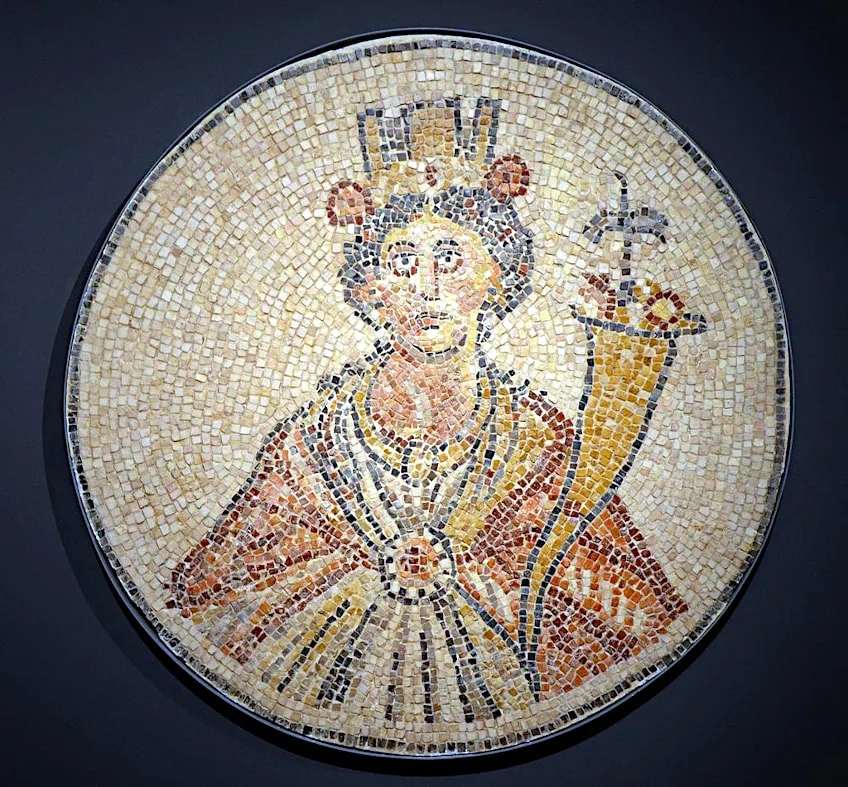 Mosaic depicting Tyche from a shop floor (6th Century CE); Carole Raddato from Frankfurt, Germany, CC BY-SA 2.0, via Wikimedia Commons
Mosaic depicting Tyche from a shop floor (6th Century CE); Carole Raddato from Frankfurt, Germany, CC BY-SA 2.0, via Wikimedia Commons
Tyche’s Background and Family
As the personification of an idea, Tyche lacks the complex family connections typical of most Greek divinities. She was in some accounts considered a daughter of Zeus Eleutherios (“the liberator”), but no other parentage is attributed to her. Over time, she became assimilated with goddesses whose areas of influence included fate such as Nemesis and Isis. She was most often depicted alongside Plutus, the personification of wealth.
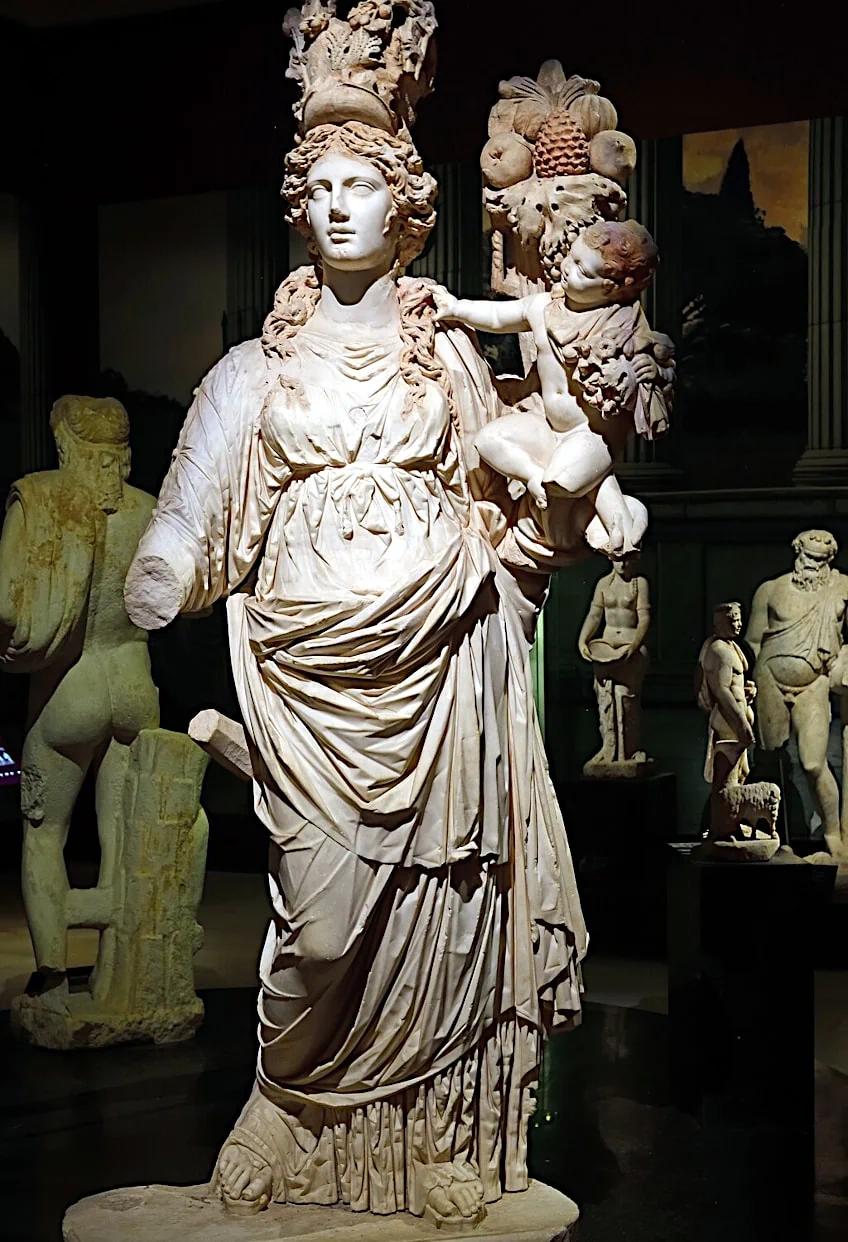 Statue of Tyche holding an infant Plutus (2nd Century CE); Dosseman, CC BY-SA 4.0, via Wikimedia Commons
Statue of Tyche holding an infant Plutus (2nd Century CE); Dosseman, CC BY-SA 4.0, via Wikimedia Commons
The Greek historian Polybius felt that when no explanation could be found for catastrophes such as droughts, floods, frosts, or even political events, the cause could potentially be assigned to the actions of the Greek goddess Tyche.
As the goddess of destiny and fortune, she could even grant victory to a less powerful athlete. Due to being the goddess of money, her image can be found on certain coins, such as those that were minted by the Hellenistic king Demetrius I Soter. Furthermore, Tyche started to symbolize not just personal fate, but also communal fate. Every city had its own Tyche who guarded its fate. Such Tychai were depicted with mural crowns that resembled city walls. The practice was preserved in Roman art imagery long into the Christian era.
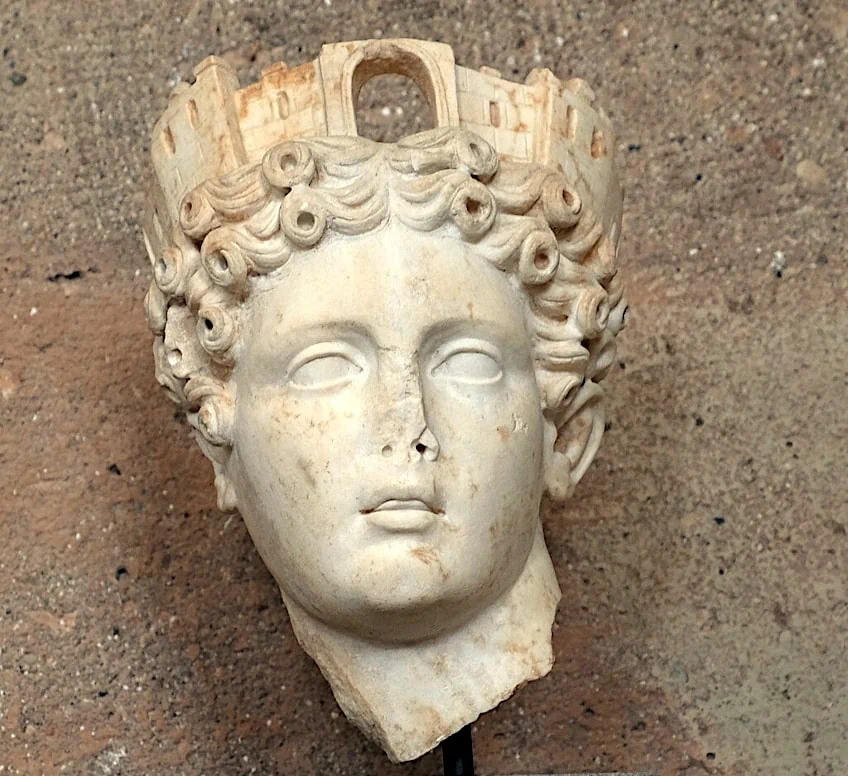 Head of Tyche showing her city wall crown (late 1st Century BCE); Davide Mauro, CC BY-SA 4.0, via Wikimedia Commons
Head of Tyche showing her city wall crown (late 1st Century BCE); Davide Mauro, CC BY-SA 4.0, via Wikimedia Commons
The Significance of the Greek Goddess Tyche
Tyche as a concept was recognized by the ancient Greeks early on in their mythology, although she did not become a fully formed deity until the Hellenistic period. Her popularity demonstrated that the ancient Greeks believed in the idea that chance and luck determined the path of their lives. During the Hellenistic and Roman times, towns were often dedicated to her. Tyche was the go-to explanation for anything that wasn’t attributed to the Olympian gods and goddesses.
She was the perpetual force that ruled people’s fate, and dependent on their own situations, individuals either sought her assistance or disparaged her.
Her decisions were even reported to have been accepted by the other gods. She was typically portrayed as a beneficent goddess who bestowed feelings of happiness and well-being upon those who worshiped her. The Greek goddess Tyche grew in political prominence with the demise of Alexander the Great and the instability that ensued with the establishment of new Hellenistic towns across Asia Minor and Egypt.
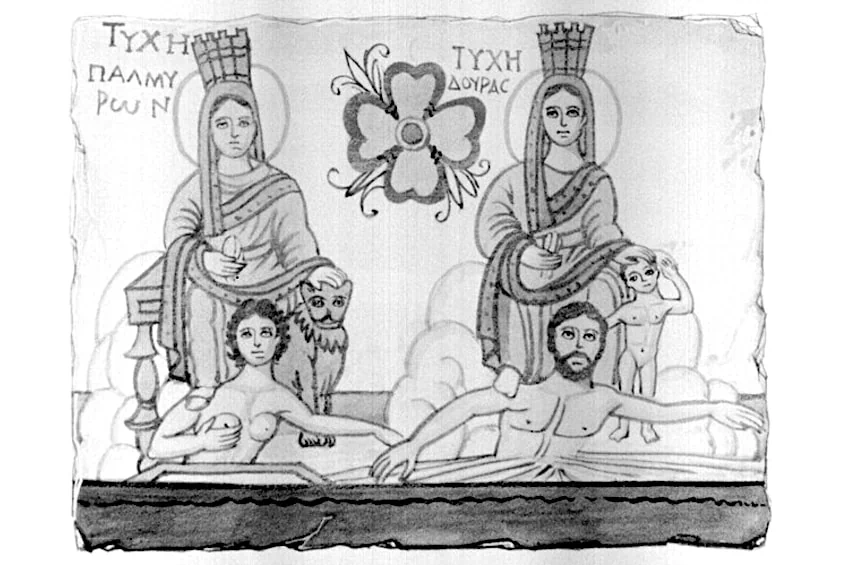 Drawing of a section of the Julius Terentius fresco (239 CE) showing the Tyche of Palmyra (unknown date); Gute, CC0, via Wikimedia Commons
Drawing of a section of the Julius Terentius fresco (239 CE) showing the Tyche of Palmyra (unknown date); Gute, CC0, via Wikimedia Commons
The Attributes and Personality of Tyche
Tyche’s personality was defined by her unpredictable nature. She was said to control the tides of fate, deciding the course of events and the destiny of individuals. As a result, she was often portrayed as a mischievous and whimsical divinity capable of bringing about unexpected changes in fortune.
Despite her fickle character, Tyche was not regarded as an evil divinity, but more as an indifferent one.
Tyche regarded as a powerful influence in the world, affecting mortals’ lives and molding their fates. People were known to make sacrifices and pray to Tyche in order to earn her favor and protection from difficult circumstances.
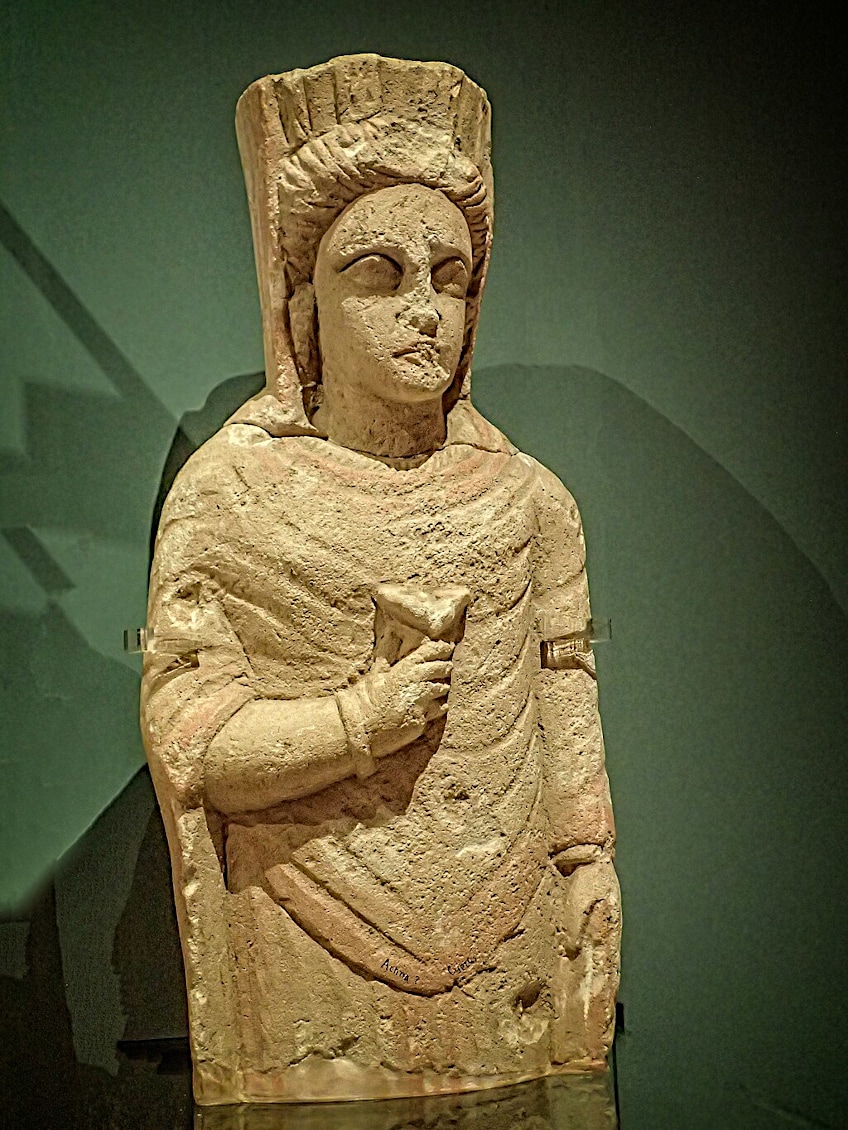 Votary statuette of Tyche (6th-5th Century BCE); Mary Harrsch, CC BY-SA 4.0, via Wikimedia Commons
Votary statuette of Tyche (6th-5th Century BCE); Mary Harrsch, CC BY-SA 4.0, via Wikimedia Commons
Appearance and Symbols
When the ancient Greeks honored her positive characteristics, they called her Eutychia, goddess of wealth, success, and good fortune. Tyche was often depicted as having wings, a majestic staff, and a crown. However, numerous depictions of her included extra items. The objects in question were associated with her diverse characteristics. When she was shown grasping a ship’s rudder or a wheel, it suggested she was in charge of global events. The wheel or ball is a prevalent Tyche symbol, signifying the ever-turning of fate. This represents the cycles of fortune, with fortunes increasing and diminishing in an ongoing process.
The ball and wheel also represents Tyche’s variable and fickle temperament, since fortunes can change quickly and unexpectedly.
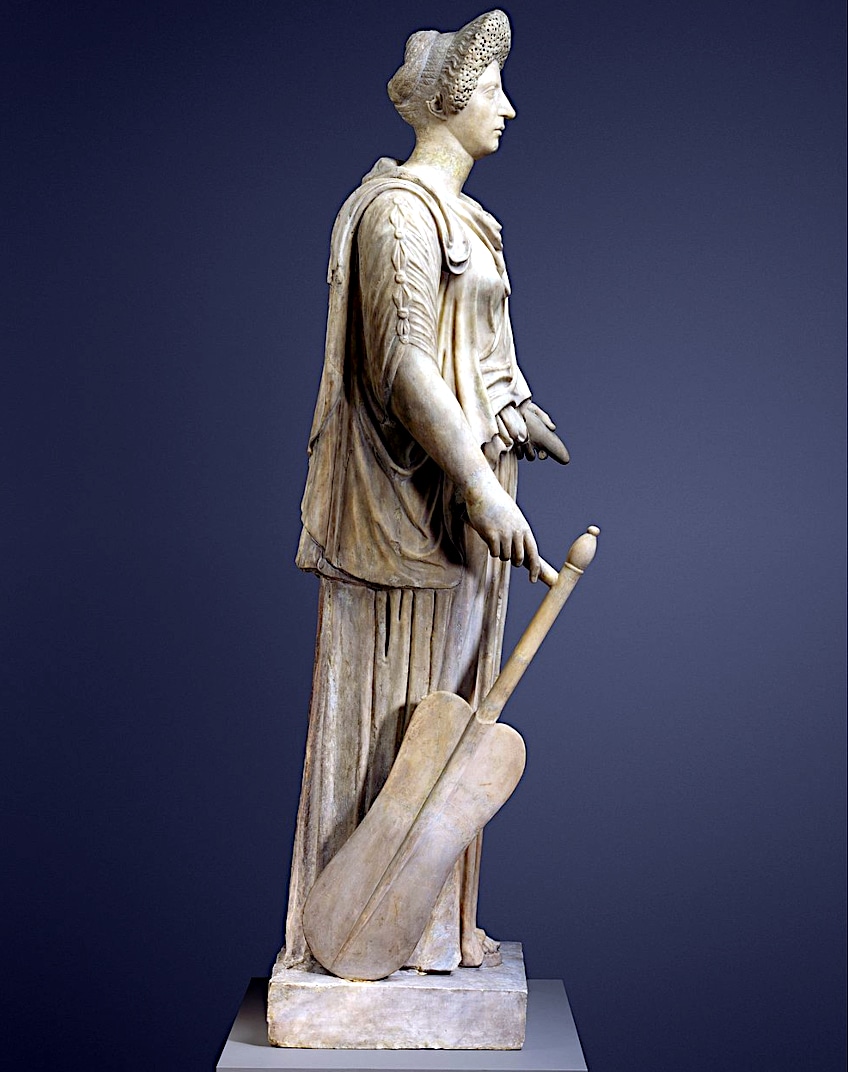 Roman statue of Tyche-Fortuna holding a rudder and cornucopia (the head is not original) (1st or 2nd Century CE); Metropolitan Museum of Art, CC0, via Wikimedia Commons
Roman statue of Tyche-Fortuna holding a rudder and cornucopia (the head is not original) (1st or 2nd Century CE); Metropolitan Museum of Art, CC0, via Wikimedia Commons
In some representations, Tyche is depicted as blind, a symbolism similar to the notion that Justice does not make her decisions based on the identity of the recipient, but purely on what they truly deserve to receive. The rudder, which often appears in Tyche’s hand, represents her power to steer and influence the path of fate. It depicts her power to determine the paths that people will find themselves on. The rudder represents control and guidance, stressing Tyche’s responsibility in navigating the uncertainties of fate.
Tyche was seen as a giver of copious fortune and wealth if she possessed a cornucopia. This is a horn-shaped container filled with flowers, fruits, and other items that represent wealth, good fortune, and abundance.
Tyche was known as Fortuna in Rome. Fortuna was even more significant to the Romans than Tyche was in the Greek pantheon. Furthermore, Fortuna was never portrayed with a ball or wings, even in later periods. This shows that the Romans exclusively considered her a goddess who bestowed good fortune on people. Tyche is sometimes portrayed carrying a pair of dice in certain depictions. The dice represent luck and chance, emphasizing the significance of unpredictability when trying to determine a specific outcome. It symbolizes the goddess’s connection to gambling and other games of chance, in which luck plays an important part.
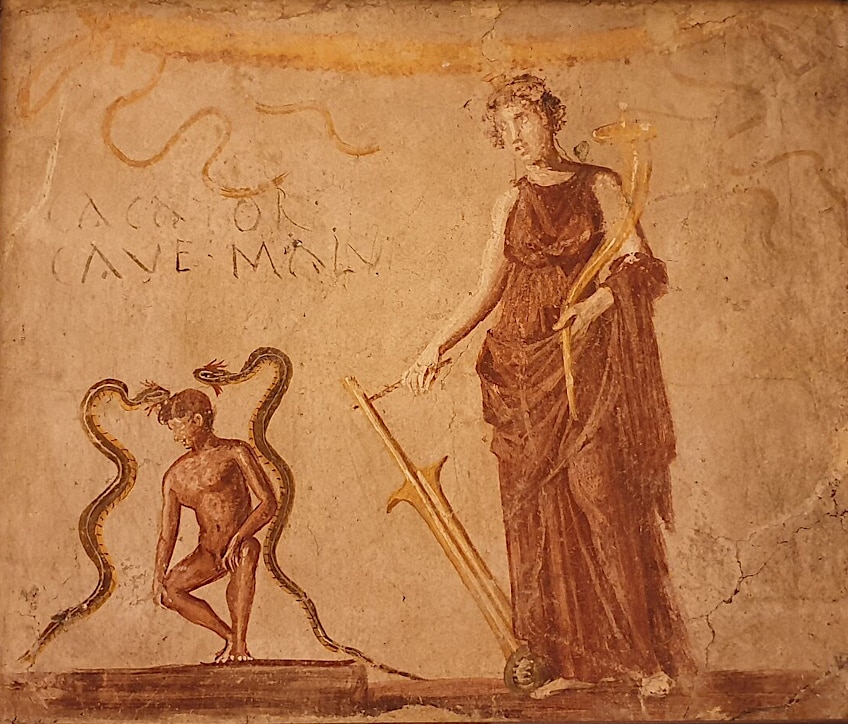 Roman fresco depicting Isis-Fortuna-Demeter with a cornucopia, rudder, and sphere (45-79 CE); Jamie Heath, CC BY-SA 2.0, via Wikimedia Commons
Roman fresco depicting Isis-Fortuna-Demeter with a cornucopia, rudder, and sphere (45-79 CE); Jamie Heath, CC BY-SA 2.0, via Wikimedia Commons
Tyche’s Worship and Domain of Influence
When Alexander the Great’s huge empire was expanded during multiple conquests, it demonstrated unequivocally that luck and chance benefited some over others. During this time, Tyche’s importance grew significantly, with temples to Tyche-Fortuna constructed in cities and several military bathhouses built. Her image could be seen on a wide range of antiquities, such as on architecture, coins, jewelry, and shrines, and she was ultimately used by governing regimes to unite disparate tribes and cults. The Tychaion is one of the most famous and frequently reproduced artworks devoted to the Greek goddess Tyche.
Although Eutychides of Sicyon’s original Tychaion has been lost to time, it has been reproduced on countless occasions. Famous replicas may be seen at the Louvre Museum and the Vatican, among other places.
The original statue, built in honor of Tyche’s patronage over the city of Antioch, was exceptional for the time since it featured detailing on all sides. It was originally produced in bronze, with symbolism such as ears of grain held in her palm to indicate the fertility of city fields, her foot pressing down on a swimmer to signify the Orontes River, and her posture seated on a rock representing Mount Sipylus.
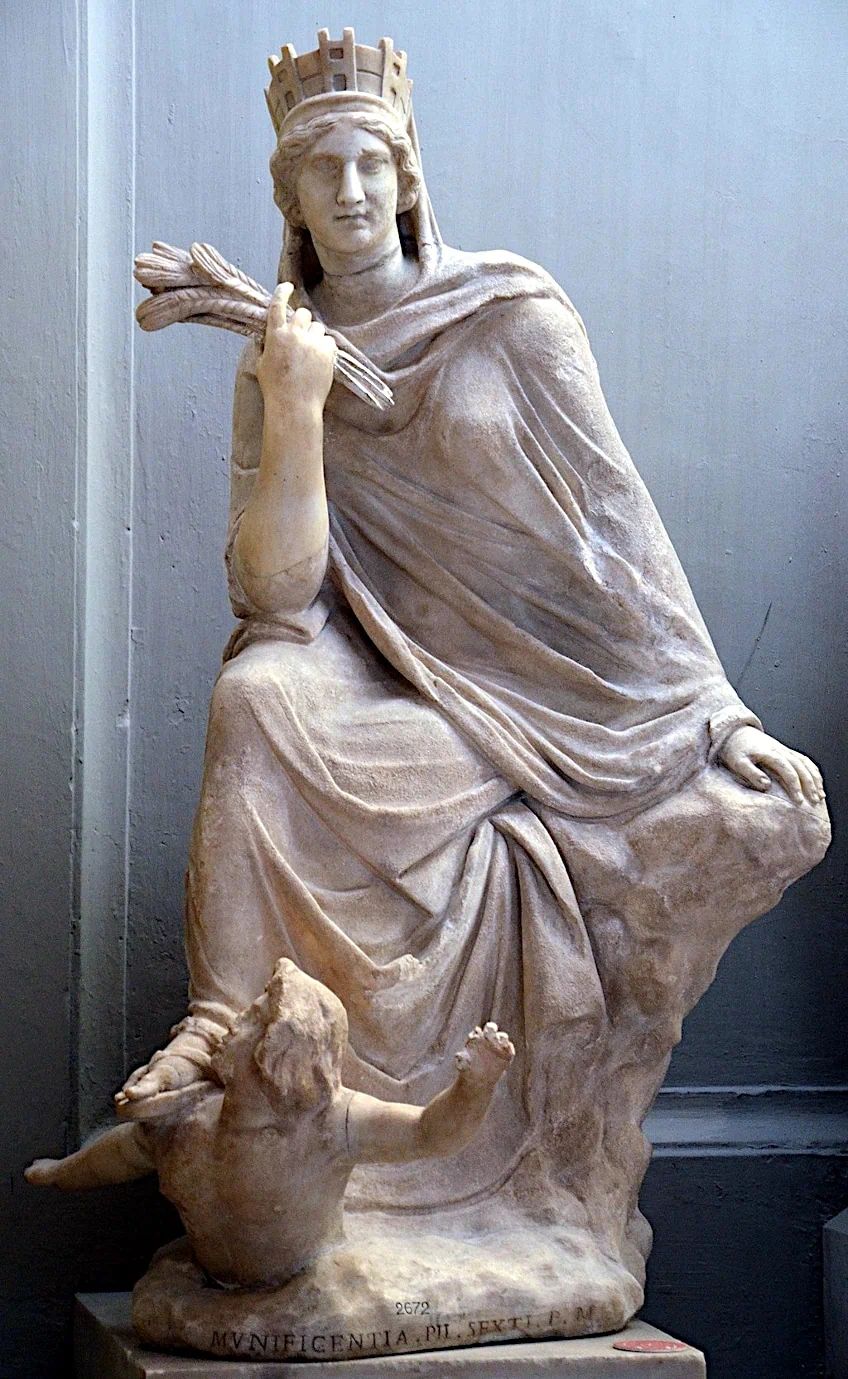 Roman copy of the Tyche of Antioch, original made from bronze by Eutychides (3rd Century BCE); Following Hadrian, CC BY-SA 2.0, via Wikimedia Commons
Roman copy of the Tyche of Antioch, original made from bronze by Eutychides (3rd Century BCE); Following Hadrian, CC BY-SA 2.0, via Wikimedia Commons
Tyche was revered in many locations around the ancient Mediterranean. Tyche’s cult began in ancient Greece in the 5th century BCE and spread throughout the Mediterranean during the 4th century BCE. Pausanias listed temples devoted to Tyche in the Greek cities of Megara, Elis, Sicyon, and Tegea in his Description of Greece. Furthermore, her shrine at Alexandria was said to be so magnificent that no other temple in the Hellenistic world could compete with it.
There were also temples built in honor of the Greek goddess Tyche in Antioch, Caesarea, Constantinople, and Palmyra.
Domains of Influence
The Greek goddess Tyche was the personification of fortune. She had authority over how chance and luck were distributed in the lives of people and societies. She had the power to deliver both good and bad luck, to shift the tides of fate, and to decide on the outcomes of events. As the goddess of money, she has the ability to bestow great success and wealth on people, families, and towns. Her domains of influence included agricultural abundance, economic success, and general well-being. The Greek goddess Tyche was often called upon and prayed to in order to gain her favor.
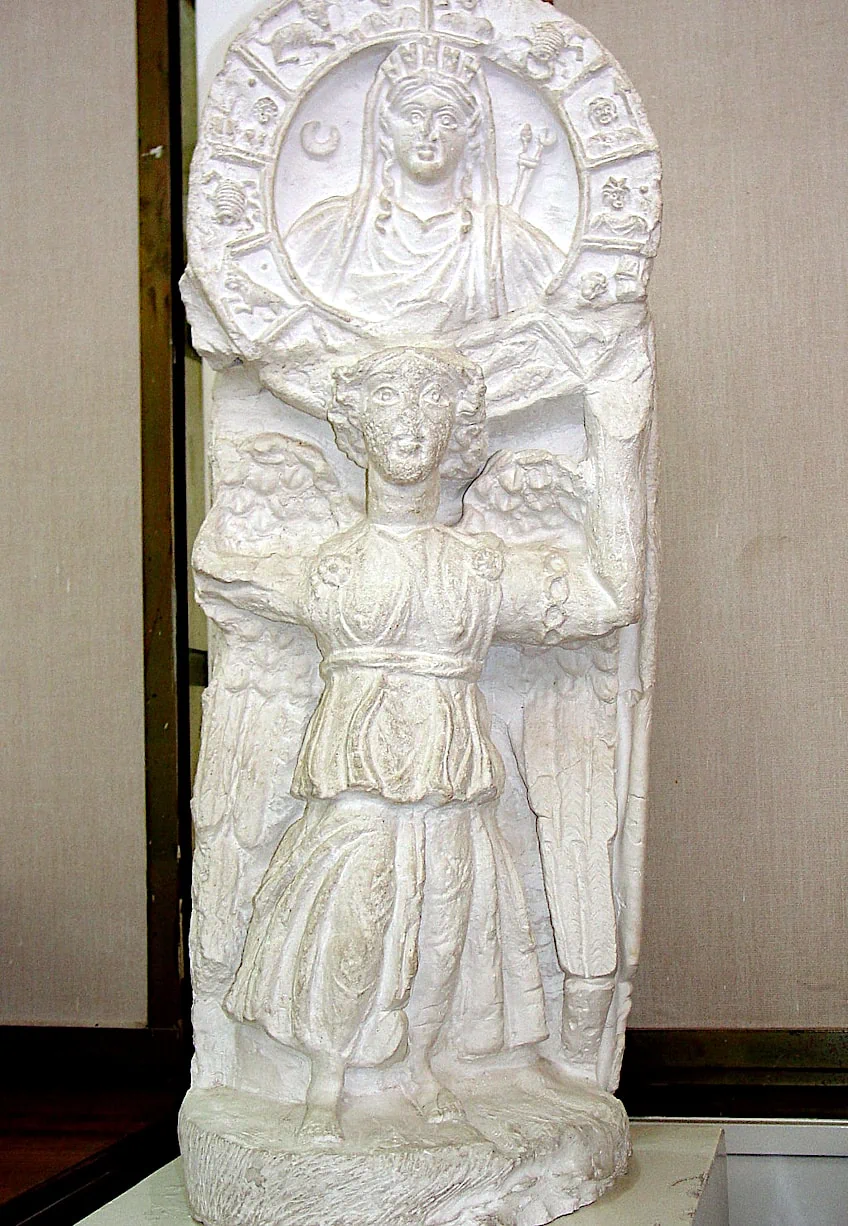 Copy of a Nabatean relief depicting a winged Nike holding a bust of Atargatis as Tyche surrounded by a Zodiac (100 CE); Michael Gunther, CC BY-SA 4.0, via Wikimedia Commons
Copy of a Nabatean relief depicting a winged Nike holding a bust of Atargatis as Tyche surrounded by a Zodiac (100 CE); Michael Gunther, CC BY-SA 4.0, via Wikimedia Commons
Tyche was revered as a protector of communities and towns. As mentioned before, cities would typically have their own Tyche, who would be venerated with rites and offerings.
Tyche’s influence was thought to secure the safety, expansion, and success of cities, as well as to protect them from disasters. She symbolized a city’s fate and destiny, ultimately affecting its success or failure. Tyche was also associated with games of chance. She represented the unpredictable results of these endeavors, revealing the role of chance in winning or losing.
Tyche and Byzantium
Tyche is an important figure in the creation myth of Byzantium. Byzas, the fabled builder of Byzantium, devoted Rhea as the Tyche of the city, uniting them both into one deity referred to as Tyche Poliade. The most significant goddesses in Byzantium are Tyche and Rhea. Even after founding Constantinople, Roman Emperor Constantine I continued to revere both of these deities, as attested by dedication rituals and statuary. On a porch around a courtyard, he erected two sculptures of Tyche Constantinopolis and Rhea.
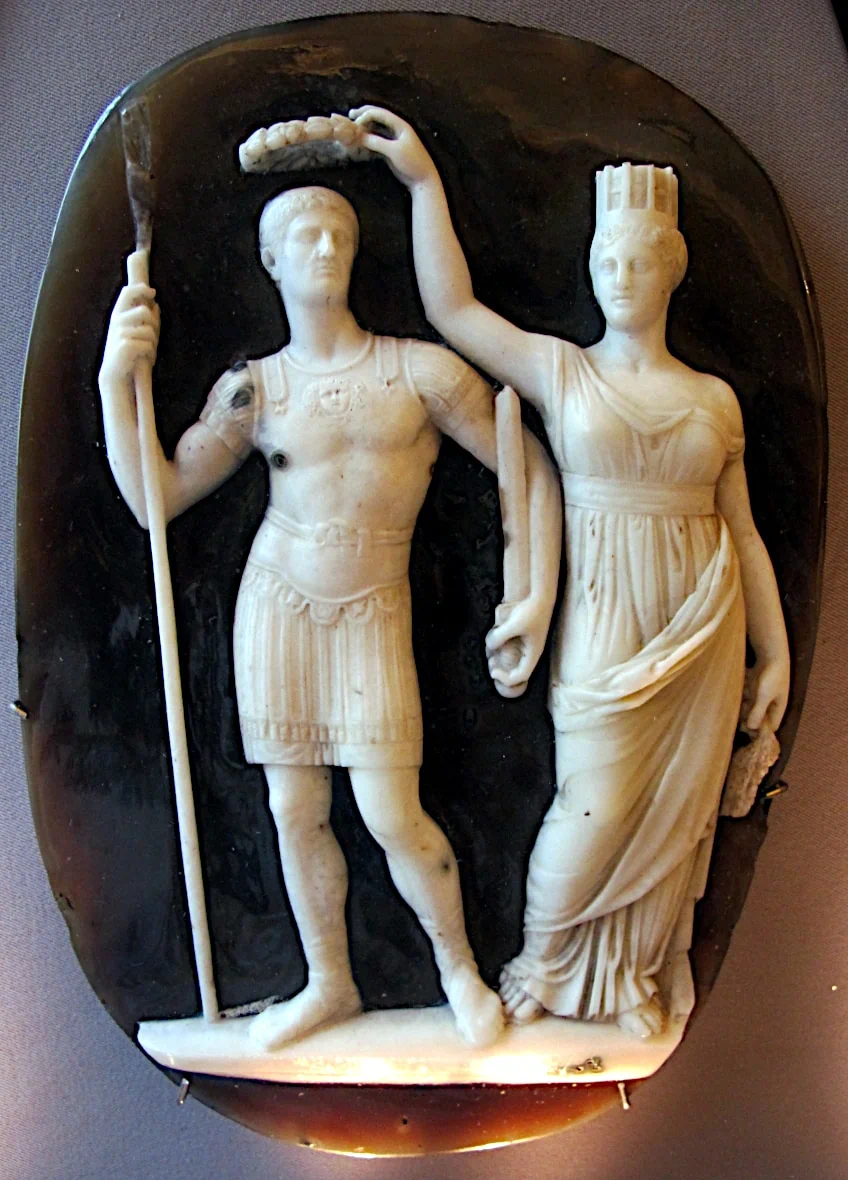 Roman glyptic depicting Constantine crowned by the Tyche of Constantinople (4th Century CE); I, Sailko, CC BY-SA 3.0, via Wikimedia Commons
Roman glyptic depicting Constantine crowned by the Tyche of Constantinople (4th Century CE); I, Sailko, CC BY-SA 3.0, via Wikimedia Commons
The cults of the two goddesses were gradually merged with those of other deities. Tyche’s cult and worship were intertwined with that of Demeter, Athena, and Hecate.
Tyche in Literature
Tyche is also a prominently featured character from Aesop’s Fables. Aesop used Tyche to illustrate how people were hesitant to acknowledge good fortune but ready to point the finger at Tyche when everything went wrong. This was apparent in one story when Tyche woke up a traveler who had fallen asleep beside a well because she didn’t want to be held responsible if he fell in.
In another fable, Tyche also chastises a farmer for praising Gaia when riches are found in his field but ignoring Tyche. Tyche continues, saying that the farmer will be eager to point the finger at her if he becomes sick or has his wealth taken from him, but pays her no attention when good fortune comes his way.
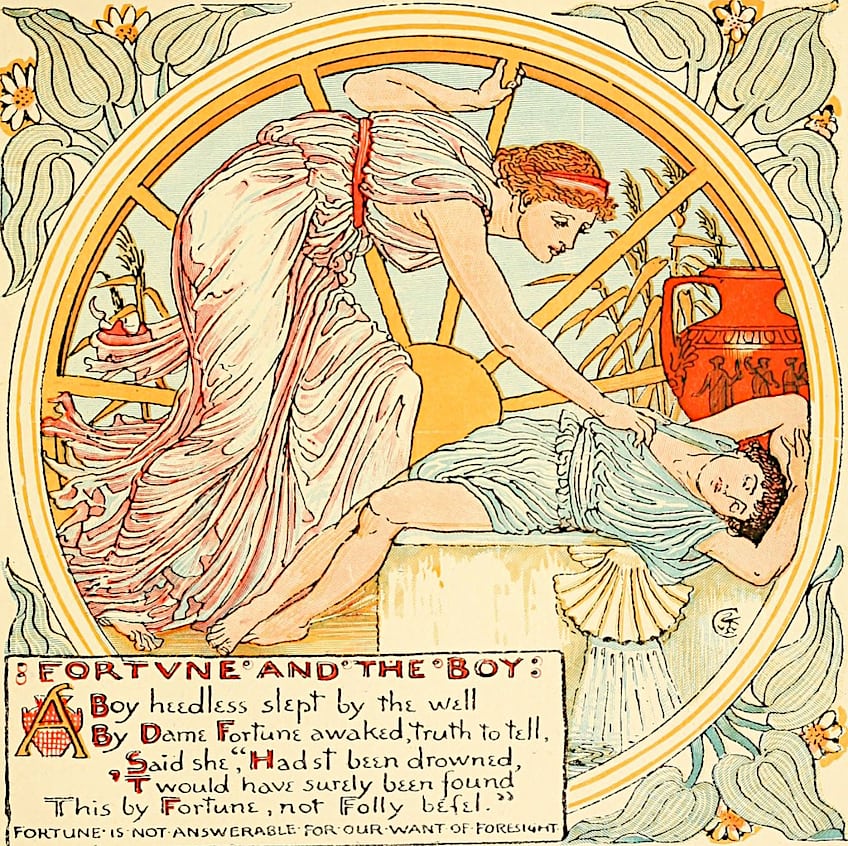 Fortune and the Boy by Walter Crane and Edmund Evans (1908); Internet Archive Book Images, No restrictions, via Wikimedia Commons
Fortune and the Boy by Walter Crane and Edmund Evans (1908); Internet Archive Book Images, No restrictions, via Wikimedia Commons
There is another one where Tyche is asked by Zeus to show man two routes, one of which ultimately leads to freedom and the other of which leads to enslavement. The path to freedom is initially tough and rough to travel, but after conquering many challenges, it becomes smooth and enjoyable. The path to slavery, however, starts off rather nice before turning into an unattainable path.
Euripides, a well-known ancient Greek playwright, used Tyche as a personification of forces and a literary device in his plays.
Tyche, as a personification of chance and luck, occurred often in Euripides’ works to emphasize the unpredictability of fate and its significant effect on the lives of the protagonists. Tyche is referenced in the play The Bacchae in the context of Dionysus’ arrival at Thebes. The chorus sings about Tyche, emphasizing her importance in shaping the fate of events. She is represented as a divinity who can grant both blessings and curses, highlighting the unpredictability of fortune.
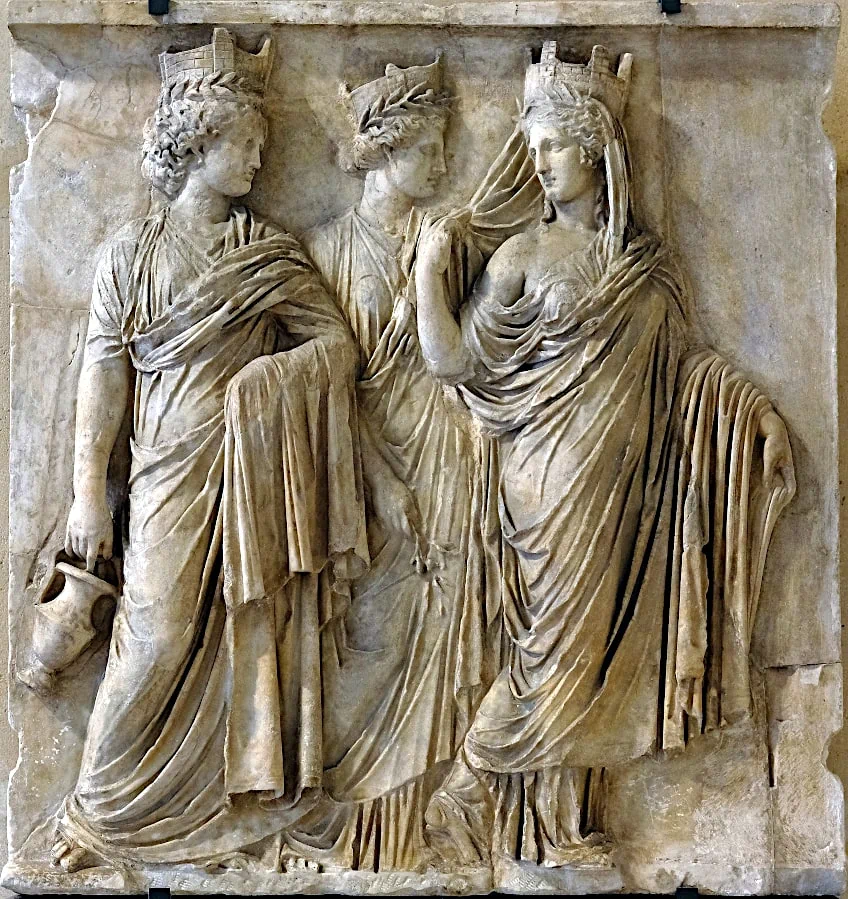 The Three Tyches (c. 160 CE); Louvre Museum, Public domain, via Wikimedia Commons
The Three Tyches (c. 160 CE); Louvre Museum, Public domain, via Wikimedia Commons
Tyche is also mentioned in Iphigenia at Aulis, when the main character, Agamemnon, the head of the Greek army, faces a predicament. To satisfy the gods and secure a favorable wind for the Greek fleet, he has to decide if he should sacrifice his daughter Iphigenia. Tyche’s impact is recognized as Agamemnon contemplates the implications of his decisions and the role of chance in the events that would unfold. In the drama Helen, Tyche is invoked in order to make sense of the unexpected twists and turns of fate.
The character Helen, famed as the cause of the Trojan War, laments her misfortunes and associates them with Tyche’s deeds. The drama explores the premise that Tyche can alter people’s fates independent of their deeds or intentions.
The Influence and Legacy of Tyche Through the Ages
Tyche is regarded as a rather old deity in the Greek pantheon. However, her role did not end in ancient Greece. Tyche’s influence and worship continued to expand and be adapted in many different ways after the Greek era, spanning diverse periods of time and cultures.
From the Hellenistic Era to the Baroque Era
Tyche’s worship grew throughout the Hellenistic era, as Greek culture and civilization spread. Tyche was connected with the wealth and fortune of cities during this time period, and her cult gained prominence as the protector goddess. Cities constructed temples and statues dedicated to Tyche, and she was portrayed carrying her cornucopia and rudder, which represented wealth and guidance. Tyche’s influence lasted until the Roman period when she was combined with the Roman deity Fortuna. Local variations of Tyche arose as Greek and Roman civilizations expanded throughout the Mediterranean and beyond.
Variations of the goddess were identified with distinct landscapes, towns, and civilizations in different locations. These regional versions sometimes combined Tyche features with regional deities or beliefs, illustrating the syncretic aspect of ancient faiths.
In ancient Syria, the city of Antioch became a key center for Tyche worship. Seleucus I Nicator, the city’s founder, is claimed to have been prompted by a vision in which Tyche directed him to create a city. Tyche and Hermes’ united religion thrived at Antioch, with complex ceremonies, parades, and festivities devoted to the goddess of destiny and fortune.
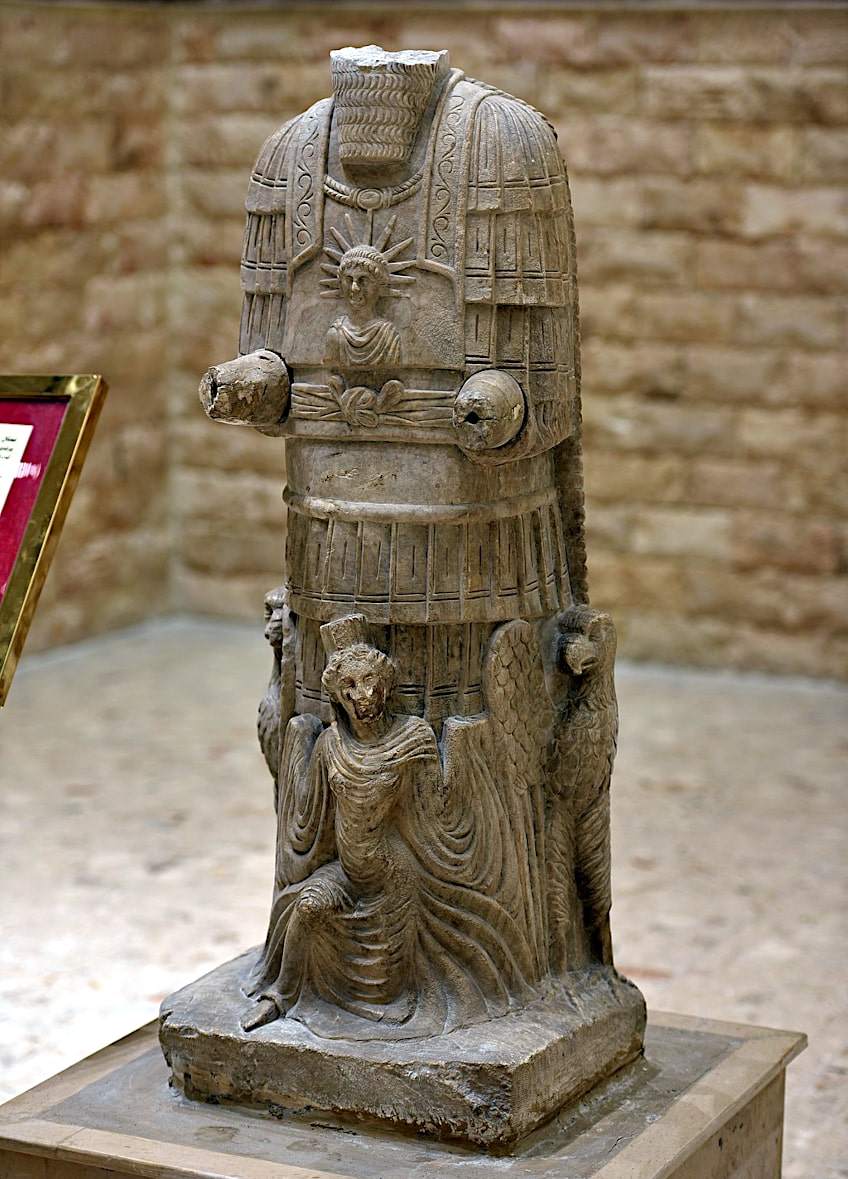 Statue of Assur Bel with Shamash on his cuirass and Tyche at his feet (2nd-3rd Century CE); Osama Shukir Muhammed Amin FRCP(Glasg), CC BY-SA 4.0, via Wikimedia Commons
Statue of Assur Bel with Shamash on his cuirass and Tyche at his feet (2nd-3rd Century CE); Osama Shukir Muhammed Amin FRCP(Glasg), CC BY-SA 4.0, via Wikimedia Commons
Tyche’s concepts of fate and destiny inspired intellectual and theological thought for centuries. Stoic thinkers, for example, considered Tyche’s role in debates on determinism and accepting fate. Tyche’s thesis also affected early Christian theology, notably debates over the link between the hand of God and human choice. Tyche’s symbolism and qualities inspired painters throughout the Renaissance and Baroque eras.
Paintings, sculptures, and ornamental art frequently represented Tyche or Fortuna, drawing on the goddess’s classical iconography. These pieces of art depicted Tyche as a character who embodied both life’s fortunes and misgivings.
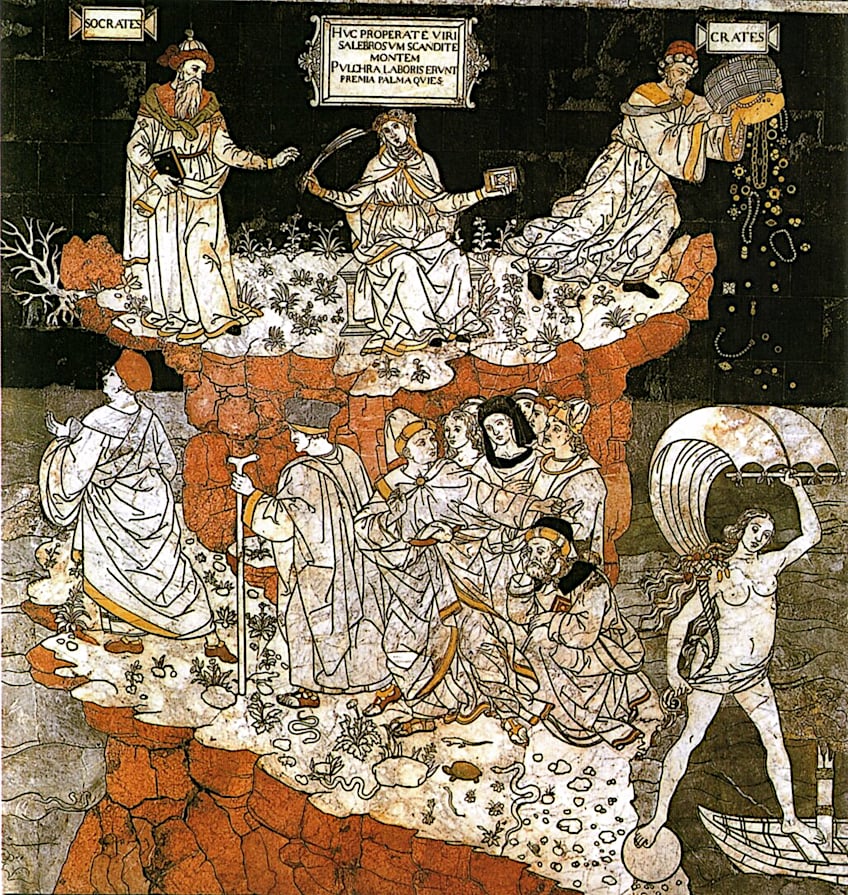 Allegory of the Hill of Wisdom with Tyche-Fortuna in the lower right corner by Pintoricchio, also known as Benetto di Biagio or Sordicchio (15th Century); Pinturicchio, Public domain, via Wikimedia Commons
Allegory of the Hill of Wisdom with Tyche-Fortuna in the lower right corner by Pintoricchio, also known as Benetto di Biagio or Sordicchio (15th Century); Pinturicchio, Public domain, via Wikimedia Commons
Modern Influence
The concept of chance and luck is universal. Tyche embodies the erratic nature of fortune and its influence on individuals and civilizations. This notion connects with individuals across all countries and eras. Tyche’s symbols, such as the wheel of fortune and the cornucopia, have become well-known themes in a variety of media. They are employed to represent ideas like fortune, luck, and abundance.
 Fortuna’s Fountain by Stephan Balkenhol (2018); Gouwenaar, CC BY-SA 4.0, via Wikimedia Commons
Fortuna’s Fountain by Stephan Balkenhol (2018); Gouwenaar, CC BY-SA 4.0, via Wikimedia Commons
Tyche’s symbols have been adapted into logo designs, turning them into visual depictions of prosperity and luck.
Tyche’s associations with gambling make her relevant in the realms of gaming, casinos, and entertainment. Tyche’s symbols, such as her cornucopia, can be found in slot machines and other gambling-related media.
The Lessons of the Greek Goddess Tyche
Tyche embodied the erratic and fickle character of fate. She emphasized that fortune and fate could change quickly, moving swiftly from good to terrible and vice versa. Because individuals could neither control nor foretell their fate, this lesson highlighted the importance of humility and prudence. Tyche emphasized the importance of chance and fate in molding people’s lives. She represented the concept that external forces beyond one’s control might have a substantial influence on one’s fate. This lesson taught Greeks to acknowledge the effect of chance and circumstance and to deal with life’s ups and downs with grace.
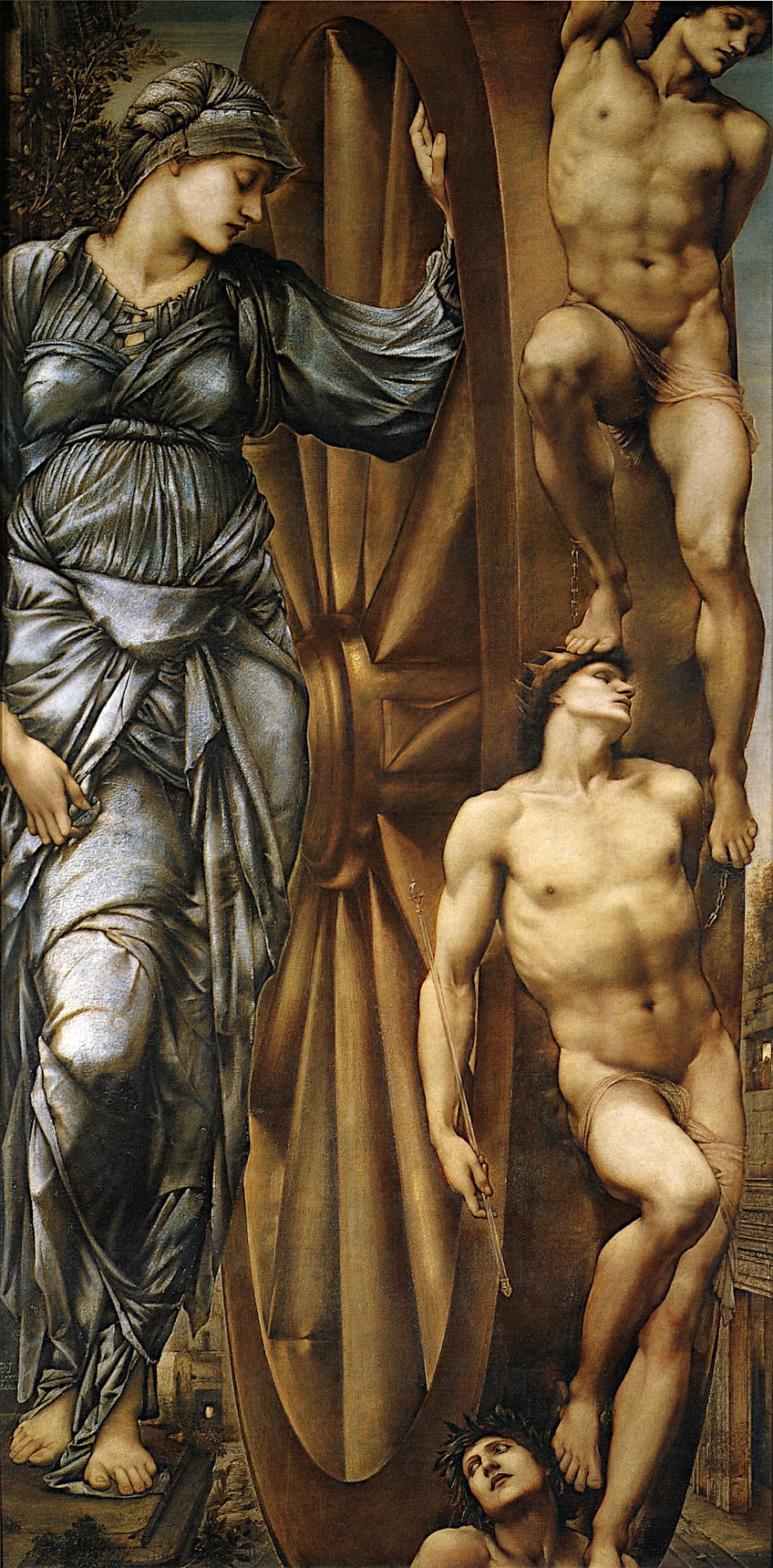 The Wheel of Fortune by Edward Burne-Jones (between 1875 and 1883); Edward Burne-Jones, Public domain, via Wikimedia Commons
The Wheel of Fortune by Edward Burne-Jones (between 1875 and 1883); Edward Burne-Jones, Public domain, via Wikimedia Commons
Tyche showed that good fortune was often accompanied by the possibility of tragedy. Her symbols, which included the wheel of fortune, highlighted the cyclical essence of luck, with some people having ups and others enduring downs.
This lesson encouraged Greeks to be grateful for their blessings while also showing empathy and compassion to those who had suffered a tragedy. Tyche’s mythology emphasized the perils of excessive pride and arrogance. She had the power to chastise people who grew arrogant or took their fortunate circumstances for granted. This lesson acted as a reminder to be humble and to credit success to chance and other variables rather than personal talent alone.
Tyche, the Greek goddess of destiny and fortune, was an important and ancient figure in Greek mythology. Her ongoing appeal originates from her depiction of fortune’s unstable and erratic nature, the role of chance and fate in molding our lives, and the subsequent lessons of humility, appreciation, and balance. Tyche’s influence transcends the Greek age, leaving an indelible mark on art, society, and philosophical thinking. Tyche’s themes and symbols are still relevant today, reminding us of the unpredictability and ever-changing nature of chance and fate in our lives. As the goddess of money and fortune, she is still a relevant figure in spheres such as gambling and games of chance.
Frequently Asked Questions
What Are Tyche’s Symbols?
Because she is associated with fortune and chance, her symbols reflect these aspects too. For example, one of her most prominent symbols is the cornucopia, as this represents abundance to the people of the ancient world. The wheel of fortune and a ball are other prominent symbols, indicating her role as the unpredictable goddess of destiny and fortune.
What Was the Role of the Greek Goddess Tyche?
Tyche was considered the personification of luck and chance. She was praised for the good fortune she brought, as well as blamed for any misfortune that befell anyone. Chance is not always fair though, and often the erratic nature of chance would result in fate bestowing blessings on those who had done wrong, or curses on those who had done no wrong.

I am deeply passionate about history and am constantly fascinated by the rich and complex stories of the past. As the editor-in-chief of learning-history.com, I have the opportunity to share this passion with a wide audience through the creation and distribution of engaging and informative content about historical events, persons, and cultures. Whether it’s through writing articles and blog posts or creating videos or podcasts, I strive to bring the past to life in a way that is both accurate and enjoyable. My expertise in history, combined with my strong writing and communication skills, allows me to effectively communicate complex historical concepts and make them accessible and interesting to a wide range of readers. I am truly grateful for the opportunity to share my love of history with others through my work on learning-history.com.

